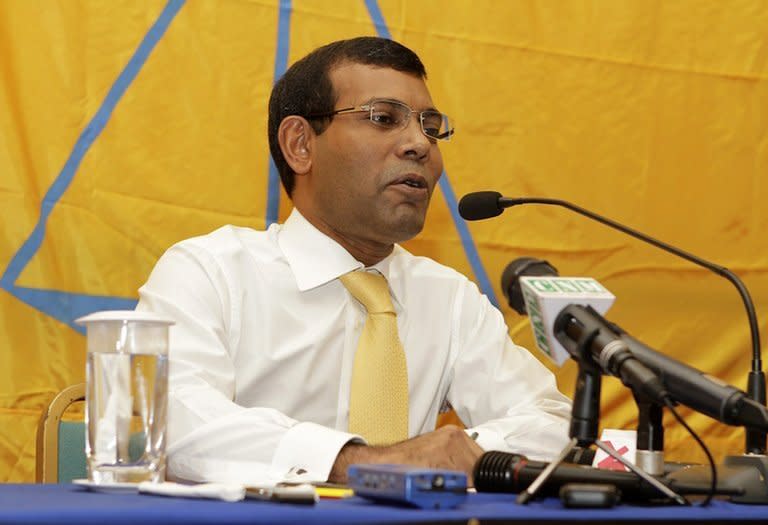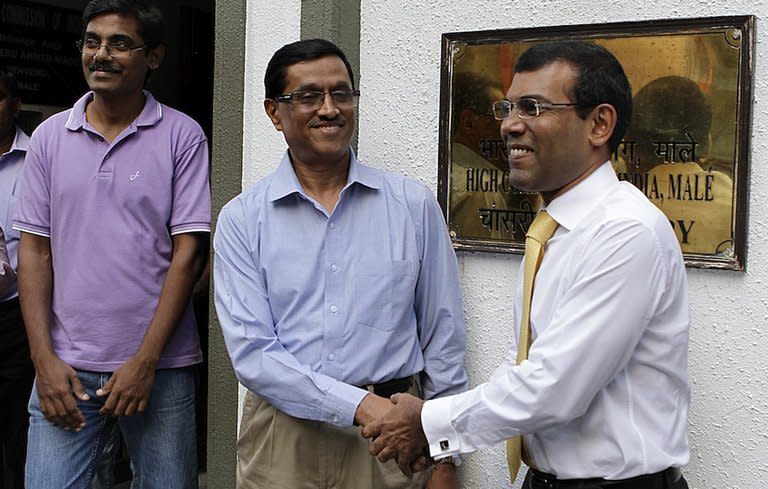Former Maldives president leaves Indian embassy
Former Maldivian president Mohamed Nasheed left the Indian embassy in the capital Male on Saturday, 10 days after his dramatic flight to the mission to evade arrest for alleged abuse of power. Nasheed sought refuge at the embassy on February 13, straining ties between India and its tiny neighbour, after an arrest warrant was issued following his failure to attend court for what he called a "politically motivated" trial. He left the embassy premises on Saturday after an Indian envoy won assurances from authorities that he would be free to campaign for presidential elections in September, Nasheed's opposition party said. But the Maldivian and Indian governments did not comment on what prompted Nasheed's departure from the embassy. New Delhi has in the past strongly denied interfering in the internal affairs of the Maldives. "We welcome this development," Maldivian President Mohamed Waheed's press secretary said, referring to his departure from the embassy. Masood Imad added that there was no arrest warrant against the 45-year-old former leader at the moment, the Press Trust of India reported. Saturday's development came after a Maldivian court earlier this week postponed Nasheed's trial for alleged abuse of power and India sent its envoy to the nation of 330,000 Muslims to try and end the political standoff. Indian foreign ministry spokesman Syed Akbaruddin said that Nasheed entered the embassy on February 13 "of his own volition and decided to leave on his own". "It is hoped that with this development the former president will again resume his social and political life," Akbaruddin added, without elaborating. Nasheed has repeatedly insisted that the charges of abuse of power against him stemming from his time as president are a "politically motivated sham" to prevent him from leading his party in the September polls. A conviction would disqualify Nasheed from contesting the election. The pro-democracy campaigner won the first free elections in 2008 in the Indian Ocean holiday destination but he was ousted last year following a mutiny by police and troops. "He is not planning to go back (to the embassy). He has ended seeking refuge there," Nasheed's Maldivian Democratic Party spokeswoman Shauna Aminath told AFP. Nasheed had been demanding the resignation of his successor and the establishment of a neutral caretaker administration to ensure free and fair elections. But on Saturday, he sounded conciliatory, telling reporters that "even on issues that we disagree on, we can reach a compromise with the Maldivian government". His court hearing slated for last Wednesday was postponed after police said they were unable to arrest the former president following his flight to the Indian embassy. Presidential spokesman Imad has said the case against Nasheed is still pending. The Maldivian foreign ministry last weekend summoned Indian High Commissioner (ambassador) D.M. Mulay and accused India of allowing Nasheed to use its embassy for political activities -- a charge New Delhi has rejected. Meanwhile, three journalists were attacked and injured in two separate incidents early Saturday in the Maldivian capital, police said. A journalist from private, pro-opposition Raajje TV suffered serious head injuries after being beaten with an iron rod and was flown to neighbouring Sri Lanka for medical treatment, police said. Police gave no further details about the circumstances of the attack. Two female state TV reporters were assaulted while covering anti-government protests and were admitted to hospital locally but were reported to be out of danger, police said.



